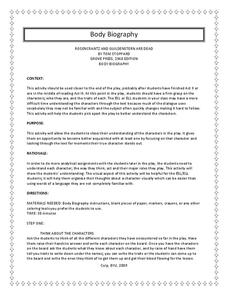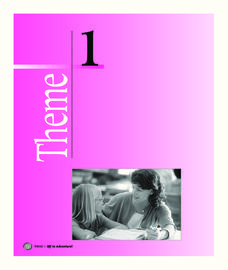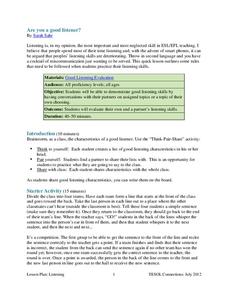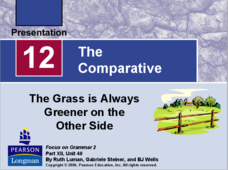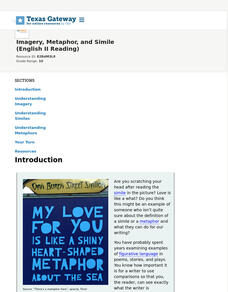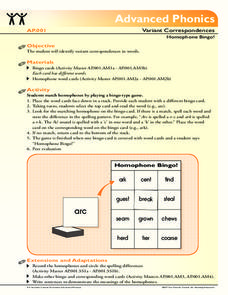Curated OER
Meet Your Neighbor: Action Verbs
Get your kids moving on the first day of school! This action verb activity doesn't have to be used as an ice breaker, but it sure will work as one. Simply place pairs of cards face-side down on the carpet, each with an action verb...
Worksheet Web
What did it Say? – Summarizing
Provide scholars with an opportunity to practice summarizing text with a two-page learning exercise. Learners read poems, share stories with their peers, and summarize their new-found-knowledge.
EngageNY
Building Background Knowledge: Learning About the Historical and Geographical Setting of Esperanza Rising (Chapter 1: “Aguascalientes, Mexico, 1924”)
Set up your class to read Esperanza Rising, by Pam Muñoz Ryan, through a class read-aloud and exploration of the setting. The detailed instructional activity outlines each step. First, class members read over the first few pages and...
John F. Kennedy Center
Writing a Myth
Tap into the imaginative minds of young learners with a creative writing activity. After reading the myth Giants and Mosquitoes, this student guide supports young writers as they brainstorm and develop their very own creation myths....
Road to Grammar
Globalization
How familiar are your pupils with globalization? Hold a discussion on that topic using the questions and viewpoints provided here. Learners can study the vocabulary and read the points of view in order to prepare for the final talk.
Bermingham City Schools
Opinion Writing
It's no secret that children can be very opinionated, but rather than fight against this natural tendency, embrace it with this primary grade writing project. After a shared reading of a children's book about persuasion, young learners...
Brigham Young University
Rosencrantz and Guildenstern Are Dead: Body Biography
Pause in your reading of Rosencrantz and Guildenstern Are Dead to take an in-depth look at the characters. Learners examine a chosen character by drawing a body and assigning quotes and traits to specific areas of the body, thinking...
Houghton Mifflin Harcourt
Off to Adventure!: Extra Support Lessons (Theme 1)
This packet, the third in the series of support materials for the Houghton Mifflin Harcourt thematic units titled "Off to Adventure!" contains exercises and drills designed for learners who need extra support with the concepts included...
National Institute for Literacy
Making Sense of Decoding and Spelling
Go over digraphs, vowel sounds, and affixes with a series of decoding and spelling lessons. Each lesson guides learners through a different reading and phonics skill, building on the lesson before, and challenging them with each step.
TESOL
Are You a Good Listener?
Your learners talk to each other every day, but are they really listening? Use a lesson plan based on listening skills to ensure that class members feel heard and respected. It includes games, discussion topics, and self-assessment tools...
Pearson
The Comparative
A lecture on comparative adjectives is good, but an engaging presentation is better! Take learners through the rules of comparing one thing to another with a slideshow about how some experiences can be better or worse than others.
Nosapo
Reading Activity: Circle the Right
Fables can teach us about life's morals, but they are also helpful for reviewing verb tense, spelling, and word choice. Three reading passages feature well-known fables, each with several opportunities for students to circle the correct...
Roald Dahl
Matilda - The First Miracle
As the story unfolds, readers discover Matilda has a superpower. Take part in an activity that has learners talking about what superpower they would have, how they would use it, and how it could help others. Then, after reading the 14th...
Prestwick House
The Strange Case of Dr. Jekyll and Mr. Hyde
The Strange Case of Dr. Jekyll and Mr. Hyde is a strange tale indeed, but a crossword puzzle based on Robert Louis Stevenson's classic story is pretty straightforward. Help learners review key facts and quotes from the book in a quick...
EngageNY
Preparation for Performance Task: Using Writing to Make Prompt Cards
Writing becomes dynamic in a presentation. Presenters transform a piece of writing they have already composed about the Little Rock Nine into a presentation. The focus is transferring ideas from their writing into short prompts on cards...
Texas Education Agency (TEA)
Imagery, Metaphor, and Simile (English II Reading)
The sixth interactive in this series introduces learners to the power of figurative language. After studying examples of similes and metaphors, readers examine how such comparisons help them see through a writer's eyes. Interactive...
Ohio Department of Education
A Glossary of Literary Terms
If you're tired of defining allusion, onomatopoeia, and satire for your language arts students, hand out a complete list of literary devices to keep the terms straight. Each term includes a definition that is easy to understand and...
Curated OER
ESL Vocabulary Connect the Dots: Shapes and Colors
Young English language learners trace color vocabulary words on the lines and match it to the correct illustration. A visual and direct approach to developing color vocabulary!
Curated OER
Lesson Plan: Sensory Exploration
Using their keen eyes and ears, learners build story observation skills which they will use to create sensory detail in their art. They note all of the things they observed on a walk, categorize them by sense, and then use the same skill...
Southern Nevada Regional Professional Development Program
Reading Literature - The Ruin
Cross-comparison, the technique of focusing on two different texts with the same themes, motifs, events, etc., is employed in an exercise that asks groups to examine two different translations of “The Ruin,” a poem, written in Old...
Curated OER
The Boy in the Striped Pajamas: Questioning Strategy
Asking questions about the text is a great way for kids to become self-sufficient readers. Use the question-and-response strategy (QAR) to get them thinking about John Boyne's The Boy in the Striped Pajamas. After they read select...
Texas Center for Learning Disabilities
Second-Grade Explicit Intervention
Unfortunately, not all students learn to read at the same pace, but with the help of this resource, you can ensure that they all receive the support they need to reach this important goal. Comprised of short literacy activities, these...
Curated OER
Subject Object Pronoun Practice
Practice substituting subjects and objects in a sentence with the correct pronouns. A grammar worksheet prompts young learners to fill in the blanks for ten missing subjects, and then ten missing objects in different sentences.
Florida Center for Reading Research
Advanced Phonics: Variant Correspondences, Homophone Bingo!
Phonics doesn't just have to be a daily routine for class members. Spruce up their phonemic awareness with an exciting game of Bingo! Young grammarians select cards, locate their matching homophones, spell the pairs, and identify how...








